Struggling to choose the right platform to launch your online store? The best ecommerce website builders can make all the difference, but with so many available in the UK, it can be tricky to find the right one for your business needs.
Luckily, Ecommerce-platforms.com's expert team has researched and found the top ecommerce website builders in the UK that cater to different business goals and requirements. Whether you're looking for ease of use, robust features, or affordable pricing, our top picks have you covered.
Best ecommerce website builders in the UK, at a glance:
- Shopify – best for growing businesses
- Wix – best for beginners
- BigCommerce – best for scaling
Each of these platforms has been handpicked to address key concerns for small and medium-sized businesses. We know you need a website that’s easy to set up and manage, so we’ve selected options that are user-friendly and feature-rich, allowing you to get your store up and running quickly.
Many ecommerce builders can become limiting as your business grows, but our recommendations provide flexibility and scalability. This ensures that as your business thrives, your platform will continue to meet your evolving needs.
Below, we dive deeper into each platform to help you choose the right solution to build a successful ecommerce store.
In this article:
- What is an Ecommerce Website Builder?
- Crowning The Best eCommerce Website Builder in the UK: What to Consider
- What are the Best Ecommerce Website Builders in the UK?
- Choosing the Best Ecommerce Website Builder in the UK
Top 5 UK Ecommerce Website Builders at a Glance
| Website Builder | Free Plan Highlights | Paid Plan Starting Price | Best For |
|---|---|---|---|
| Shopify | Unlimited products, mobile responsive themes | £25/month | Serious eCommerce businesses |
| Squarespace | Beautiful templates, no transaction fees | £10/month | Design-focused small businesses |
| Wix | 800+ templates, drag-and-drop editor | £3.50/month | User-friendly customization |
| BigCommerce | No transaction fees, scalable solutions | £29.95/month | Large catalogs, scalability |
| EKM | UK-based support, built-in marketing tools | £300/month | Only for large UK business |
What is an Ecommerce Website Builder?
Put simply; an ecommerce website builder is a platform that allows you to create an eCommerce website where you can communicate your brand and sell your products.
Ideally, the platform in question will also offer customer support and cater to all ability levels, from absolute beginners to experts. However, these intricacies and the exact web building and marketing features on offer will vary from platform to platform.
Crowning The Best Ecommerce Website Builder in the UK: What to Consider
Before diving in and choosing the best eCommerce website builder in the UK for your business, here are a few things to think about first:
1. Your Budget
Since your website will be the face of your business both now and in years to come, your online store builder needs to be cost-effective when starting out and as you scale over time. So, take a close look at all the premium plans on offer and consider the impact on your business's growth.
It's also worth bearing in mind: If your website builder requires you to hire a professional web developer, you'll need to factor these costs into your budget too.
2. High-quality Templates
If you already have an idea of how you want your site to look, your website builder has to offer templates that reflect that.
Ideally, if you’re starting out, you may want to ensure your website builder offers plenty of free, easy-to-customize templates that negate the need for a website developer.
3. Your Timetable
While building a website doesn’t take forever, it's still worth factoring this into the equation when making your choice.
If, for example, you’re going to need a developer for the backend work while you take care of the frontend, you’ll need to add that time into your schedule.
On a similar note, some website builders are easier to use than others if you're handling everything yourself. As such, the time it takes to launch a fully functioning eCommerce site will fluctuate – again; this is worth considering.
4. Your Existing Tools
Suppose you’re already selling online and happily using tools to help you manage your business. For instance, marketing, order fulfillment, analytics/customer data, etc. In that case, your website builder needs to integrate with the platforms you’re already using.
Alternatively, if you’re starting from scratch, our best advice is to look out for a website builder that offers a wide range of reputable integrations. These should complement your business needs both now and as you expand.
5. Developer vs. Go-it-alone
If it’s the latter because of budget restrictions, look for a website builder that offers excellent customer support around the clock.
Alternatively, if you don’t want to rely solely on templates and your website builder's editor; instead, you're looking for something more customized beyond your skillset. In that case, hiring a web developer is going to be a must. In this instance, make sure your website builder is open-source or provides some sort of access to your website's code. Otherwise, you'll be somewhat restricted in this regard.
That's enough preamble; let’s now take a look at our take on the best eCommerce website builders in the UK.
What are the Best Ecommerce Website Builders in the UK?
1. Shopify

Shopify is a household name in the ecommerce world, making it impossible not to include this platform when reviewing eCommerce website builders, including for the UK market. Like EKM, it offers an “all-in-one” solution for eCommerce store owners serious about online selling.
Shopify comes with a complete content management system (CMS), which enables you to easily manage all your digital content from one place.
In addition, users receive:
- Web hosting
- Access to an intuitive web page builder
- Plenty of integrations to help you run a successful online store and manage your online presence
- The ability to add all kinds of pages, including About, FAQs, contact us, a blog, etc.
…This is just the tip of the iceberg, Shopify's suite of eCommerce features is incredibly extensive, so there's no way we could cover it all here.
Shopify provides a selection of free, customizable template designs to choose from. Alternatively, if you want to veer away from Shopify's free themes, there are hundreds of website design templates to choose from. Conveniently, all Shopify themes are split into different industry categories, making finding the right design for you a breeze.
Alternatively, suppose you want to dig into your website's code to make more nuanced modifications. In that case, you can use Shopify's text editor to edit your template files and assets. First, however, you'll need a basic understanding of HTML, CSS, and Liquid to hit the ground running with this.
Alternatively, if you would rather leave your web design to the pros, Shopify also offers a website design service. Just make sure you're logged into your Shopify account, head to Shopify's website, and navigate your way to their list of designers the platform partners with. Prices for web development vary wildly, although you can narrow them down by country and by keying in your minimum and maximum price range.
Pricing
Shopify now offers a 3-day free trial forllowed by the first month at just £1. After that, you can choose from price plans starting from £25 a month for the Basic Plan up to the Advanced Shopify plan for £344 a month (when pai yearly). Shopify is perfectly suitable for UK merchants.
All plans enable you to design and launch an ecommerce website and list and sell an unlimited number of products.
Pros:
- Shopify's themes are gorgeous and mobile responsive
- There's a free trial
- There's a whopping 3,200+ add-ons and plugins to choose from
- Shopify comes with an integrated payment processor
- You can sell unlimited products
Cons:
- Costs can quickly rise if you opt for paid-for templates, premium plugins, and a web designer
- You'll have to pay extra transaction costs if you don’t use Shopify's integrated payment processor, Shopify payments
- More advanced reporting is only included with Shopify's more expensive plans.
👉 Read our Shopify review and check out our Shopify pricing guide.
How to get Shopify for £1 per month for the first 3 months?
Shopify has begun offering a special deal for sellers who sign up for a new Shopify plan. That deal?
Pay Shopify £1/month for the first 3 months of full access to the platform!
This offer is is now available on all standard plans: Starter, Basic, Shopify, and Advanced.
2. BigCommerce

BigCommerce is another all-in-one solution, but this platform is particularly famous for its scalability. You can design your eCommerce website using the platform’s drag and drop website builder. So, you don't need any coding know-how nor a developer to design and launch a beautiful website.
You can tailor your pages by adding text, images, choosing page layouts, and amending them after you’ve published your site.
There are plenty of free and paid-for themes. However, there aren’t as many free choices as other platforms, with just 12 free themes on offer and 130+ paid themes. That said, you can filter themes by industry, paid for or free, and theme type, e.g., editorial, new, small catalogs, etc.
BigCommerce has one of the largest toolsets on the market, so we can’t list them all here. But it’s worth noting that the platform seamlessly integrates with PayPal and Apple Pay and provides mobile-optimized checkouts. That said, while the more expensive plans include additional features like abandoned cart recovery emails and stored credit cards, the lower-paid program doesn’t offer this.
Not to mention, all customers have access to 24/7 chat and email support. On top of that, there’s also a sales helpline for US, UK, and International customers, available Monday to Friday during office hours. But, if you want phone support relating specifically to technical support, there’s only US-based support, which might not be as accessible for UK vendors.
Pricing
There’s a 15-day free trial period and three pricing plans starting from $29.95 a month for the Standard Plan, rising to $299.85 a month for the Pro Plan.
Pros:
- There’s a free trial option
- Unlimited storage, products, bandwidth, on all plans
- BigCommerce doesn’t charge additional transaction fees
- You can register unlimited staff accounts – which is excellent if you have a team to support you
Cons:
- There are fewer free themes to choose from
- The BigCommerce website is challenging to understand and not written for absolute beginners
- There’s an annual $50k limit on sales on the Standard Plan
- Phone support for technical queries is solely US-based.
👉 Read our BigCommerce review and check out our BigCommerce pricing guide.
3. Squarespace

Squarespace is another cloud-hosted website-building SaaS that includes web hosting and a free domain. That said, the free domain is only available if you opt for annual billing. Users also have access to award-winning templates, all of which boast a premium look that can be customized to suit your brand.
While Shopify offers more themes overall, there’s no doubt that Squarespace’s templates are more contemporary and professional-looking. Alternatively, you can also use a blank template if you would prefer to start from scratch.
In addition, Squarespace doesn’t charge transaction fees – which is a bonus! To get going, sign up for a free trial, register your domain name, choose the template you want to use, and start listing your products or services. At this point, you can also add videos, audio, forms, buttons, photo galleries, and change the layout of your site. Lastly, you’ll need to connect with a payment processor to start taking customer payments.
Pricing
There’s a 14-day free trial. Then, after that, there are four pricing plans starting from the £10 a month Personal plan (based on annual billing) moving up to £30 a month on the Advanced Commerce plan. Prices are higher if you opt for monthly billing.
Pros:
- You get access to professionally designed, customizable, mobile-friendly templates that are nothing short of stunning.
- You get a free domain name with annual payment plans
- You get access to 24/7 customer support
- Unlimited bandwidth and storage with all the price plans
Cons:
- You don’t get access to advanced website analytics on the Personal Plan
- There are fewer payment options to connect with compared to on other platforms (i.e., just Stripe, Square, PayPal)
- There isn’t an in-built multi-currency selling functionality.
👉 Read our Squarespace Commerce review and check out our Squarespace pricing guide.
4. Wix

Wix is famously user-friendly while offering a good selection of attractive themes. There are 800+ professionally designed mobile-responsive templates to choose from, organized into different categories. Once you’ve picked a template you like the look of, you can easily customize it using Wix’s intuitive drag and drop page builder. Resizing, rotating, and recoloring different elements is effortless.
Alternatively, like its competitors, Wix also provides an ADI option to help you kickstart the web design process. Just answer a few questions, and Wix will produce a website unique to your needs, complete with built-in images. From here, you can customize your color palette (if you want) and upload your own photos if you have them.
Alternatively, you can work with one of Wix’s website partners, who can design your website at an additional cost. Again, just answer a few questions, and Wix will match you with a designer that best suits your needs.
Pricing
Customers benefit from a 14-day free trial. After that, there’s a free version, but this shows Wix’s ads on your website and you're limited to using a Wix subdomain
, which doesn’t look very professional. Otherwise, there are four paid-for website plans starting at £3.50 a month for the Custom Domain Plan (if you opt for annual billing), rising to the VIP Plan costing £19 a month.
Pros:
- Unlimited bandwidth on VIP and Unlimited Plans
- Free hosting
- There are hundreds of free templates to choose from
- Wix’s pricing plans are some of the more affordable on the market
- Wix has its own in-built payment system called Wix Payments
- Wix is extraordinarily user-friendly.
- There's plenty of self-help tutorials available
Cons:
- You don’t get access to site analytics on Wix’s cheaper plans, and on the more expensive ones, you pay extra after one year to access the Wix Analytics App. While there’s a free option, after that, prices start at $8.29 a month for a Basic Plan, rising to $58.08 a month for the Pro Plus Analytics plan.
- You can’t switch templates without losing all of your website content – so choose carefully!
- If you want to switch website builders later down the road, exporting your website is very difficult.
👉 Read our Wix Ecommerce review and check out our Wix Ecommerce pricing guide.
5. EKM
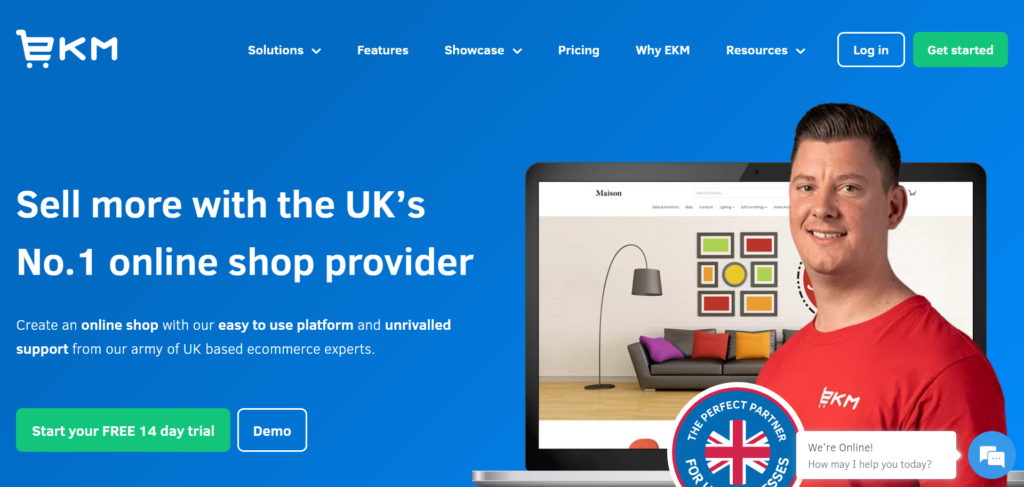
Founded in 2002, EKM is very much aimed at the UK market. However, international sellers shouldn’t necessarily be deterred by that.
With EKM, you get access to your own domain name, 70+ customisable themes, and an SSL certificate. In addition, EKM users also benefit from ongoing UK support.
EKM is what’s called an “all-in-one” platform, meaning that once you sign up, you get access to everything you need to launch an online store. Most notably, website building features a built-in payment processor and web hosting. Email marketing tools are even included, and entrepreneurs aren't charged transaction fees on their sales.
EKM's website building features include:
- A professional logo builder
- Fully responsive designs to suit all devices
- A drag-and-drop builder
- Payment card logos
…To name a few!
Lastly, EKM's themes are easily located in different categories, including food and drink, clothing, jewelry, electronics, etc.
Pricing
EKM offers a generous 14-day free trial. After that, there is only one pricing plan, at £300 wichc covers sales for uo to £300k per year. This means that EKM is extremely expensive for large business, so we only recommend it for large UK based enterprises.
None of the plans require you to enter into any kind of contract.
Pros:
- You get access to ongoing UK-based support.
- EKM's templates are gorgeous
- A domain name is included with each pricing plan.
- EKM doesn't charge transaction fees
- The Basic plan offers an initial welcome support call, and the more expensive packages unlock access to a dedicated account manager.
Cons:
- The prices look expensive.
- You have to factor in additional costs that may increase because prices don’t include VAT.
- Compared to some of the other options on this list, EKM doesn't offer much in the way of native third-party apps.
👉 Read our full EKM review.
7. Square Online
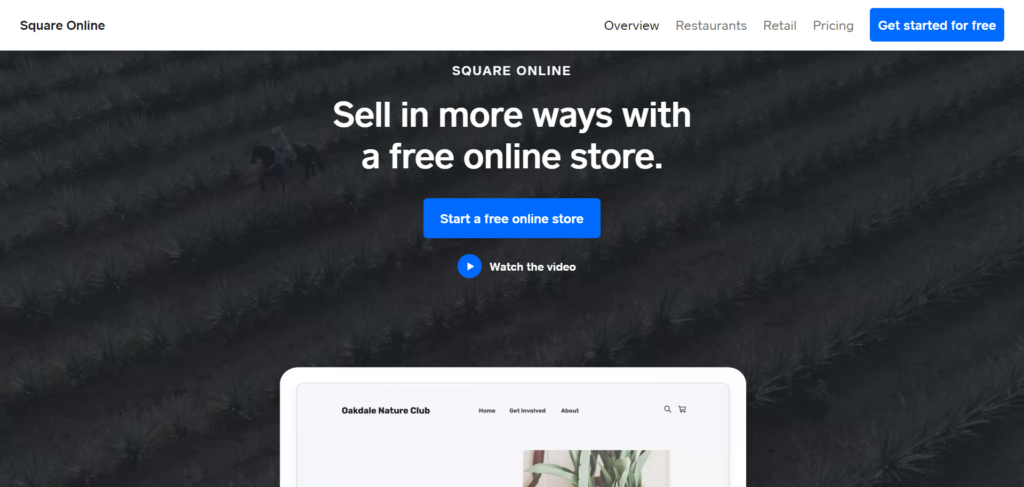
Square Online is a site-building technology brought to you by the digital payment company, yes, you guessed it, Square.
Businesses that already use Square to process payments can use Square online for free. Powered by Weebly, the website builder is easy to use and aimed at smaller businesses and those with a physical presence, including food and drink outlets. Namely because Square online makes it relatively easy to take bookings. In addition, Square's inventory management features are nothing short of impressive. They make it very easy to sync your in-store and online inventory so that you can manage everything from one centralized place.
Square Online predominantly uses artificial design intelligence. Here, you give Square Online some info about what you want your website to look like, and then it does the rest on your behalf.
You also get access to a range of responsive, customizable templates to showcase your products. Then, once you’re happy with your web design, you can add your products or sync them from your Square POS system.
Simple, right?
Pricing
There are no monthly fees or startup costs to set up a website; you just pay a processing fee when you make a sale. These start at 1.9% per transaction.
If Square's free website builder doesn’t offer the storage space you need, there are three paid plans, with prices starting at £9 a month billed annually + VAT up to £54 a month billed annually + VAT. Some of the features included in the cheapest plan are a free custom domain, no Square ads on your site, and customized font uploads. Naturally, these features are also included in the more expensive packages, with the most costly plan also offering lower payment processing fees (1.75% per UK and EEA purchase)
Pros:
- There are no monthly fees or startup fees
- It’s simple to use
- You can sync your online and offline inventories, making Square an excellent option for online sellers with brick-and-mortar stores
Cons:
- You only get access to 500 MB storage on the free program, whereas it’s unlimited on all other plans
- Unless you opt for Square’s own payment gateway, you’ll have to pay more expensive transaction fees
- Some users complain that design customization is somewhat restricted.
👉 Read our comprehensive Square Online review.
6. Jimdo – Cheapest Option in the UK
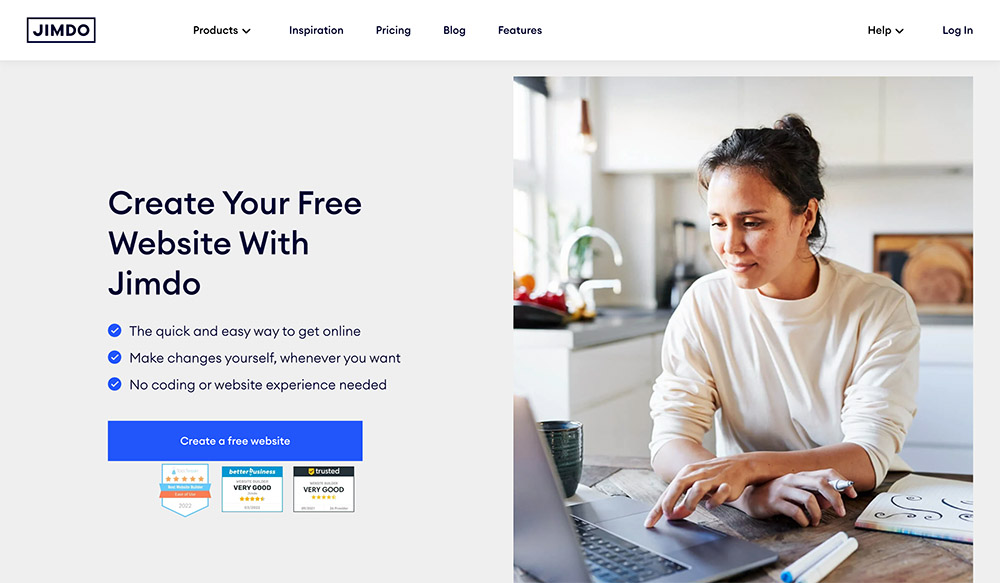
Jimdo is a German-based website builder that offers small ecommerce businesses a cost-effective solution.
It’s free to sign up, with no credit card needed. After that, you can either have Jimdo build a website for you or use its website creator option, where you do all the work from scratch. This latter option involves coding and tinkering with customizable templates.
Focussing on the first option, when you ask Jimdo to build your website, it does this in seconds. All you need to do is answer a few simple questions about your site’s purpose, what color palette you like, design style, and so on.
Once this is done, your website pops up, and you're automatically taken to a dashboard from which you can customize your website's text colors and add images. Where the latter is concerned, you can do this from your Facebook and Instagram accounts and add royalty-free images from Jimdo's free image library.
One positive about Jimdo is that it doesn’t charge transaction fees, a bonus, particularly for smaller businesses! You also get a free domain for a year.
Pricing
It’s free to create or have Jimdo make a site for you but to access eCommerce capabilities, you need to upgrade to a paid eCommerce plan. There are three of these, with prices starting from £15/month for the Basic plan and rising to £39/month for the VIP plan.
Alternatively, if you’re a business that simply wants an online presence with a landing page and a few added pages, you can opt for one of five website plans; the first of these is free (with no free domain), and then paid plans start from £9/month for the Start plan, rising to £39/month for the Unlimited plan.
Pros 👍
- It’s super quick to sign up.
- Jimdo creates an attractive site for your ecommerce store in seconds.
- It's free to sign up.
- You can customize Jimdo’s block design by adding and editing text, changing fonts and colors, and resizing images.
- Aside from PayPal and Stripe, Jimdo also works with PayPal Pay Later and Sofort in the UK.
- The prices are low and, therefore, affordable for smaller UK eCommerce business owners.
Cons 👎
- You don’t have access to customizable website templates when Jimdo creates a site on your behalf.
- You have to sign up for the most expensive eCommerce plans to receive customer support within an hour.
- Trustpilot users complain about lengthy customer support response times, poor tech support, and problems when trying to cancel their Jimdo subscription.
Please read our full Jimdo Review for a more detailed outline of what it can and cannot do for your business.
8. GoDaddy
While better known for its domain registration and hosting services, GoDaddy now also offers website building.
GoDaddy is another platform offering artificial design intelligence (ADI), providing what it calls GoCentral Website Builder. This particular tool gives you the power to create a website quickly. It has drag and drop editing capabilities, but you can also swipe through designs and choose the ones you prefer for your website.
GoDaddy summarizes its offer for manual website creation in four steps:
- Pick a template to start building your site for free
- Add your content
- Use GoDaddy’s built-in marketing to promote your business
- Manage everything from one dashboard.
GoDaddy’s templates are mobile-friendly and attractive enough, organized into categories including fashion, beauty, photography, health, fitness, travel, etc. There are hundreds of options available, with no technical skills needed to edit them, the GoDaddy website makes no reference to whether these are free or paid for, but it does state on its homepage that you can pick a template to start yours for free. Then, you just click on your chosen template to add text, choose fonts and colors, and add sections such as price lists or menus using GoDaddy’s drag and drop editor.
There’s also free professional photography available if you’re yet to find your own images. GoDaddy also boasts in-built tools for SEO (search engine optimization), social media, and email marketing. All customers receive an SSL security certificate, the ability to edit your website via a mobile, tablet, or desktop, and website analytics. However, customers on the cheapest plan don’t have access to GoDaddy’s SEO features.
Lastly, there’s also 24/7/365 customer support available and a dedicated UK phone number for customers needing help.
Pricing
There’s a month-long free trial and four pricing plans starting at £6.99 a month (when billed annually) for the Basic Plan, rising to £19.99 a month for the eCommerce plan.
Pros:
- GoDaddy’s pricing is incredibly reasonable
- Access to quick and supportive 24/7/365 customer service
- The templates are easy-to-use
- You get an SSL certificate with every pricing plan
- There’s a generous month-long free trial
Cons:
- SEO tools aren’t available for Basic plan customers
- GoDaddy’s features aren’t very advanced
- Customization control is minimal – you build pages by adding pre-designed sections, and there’s no leeway here. For example, you can’t add extra elements or move things around inside these sections – instead, you’re restricted to toggling existing elements inside these sections on or off.
9. Webflow
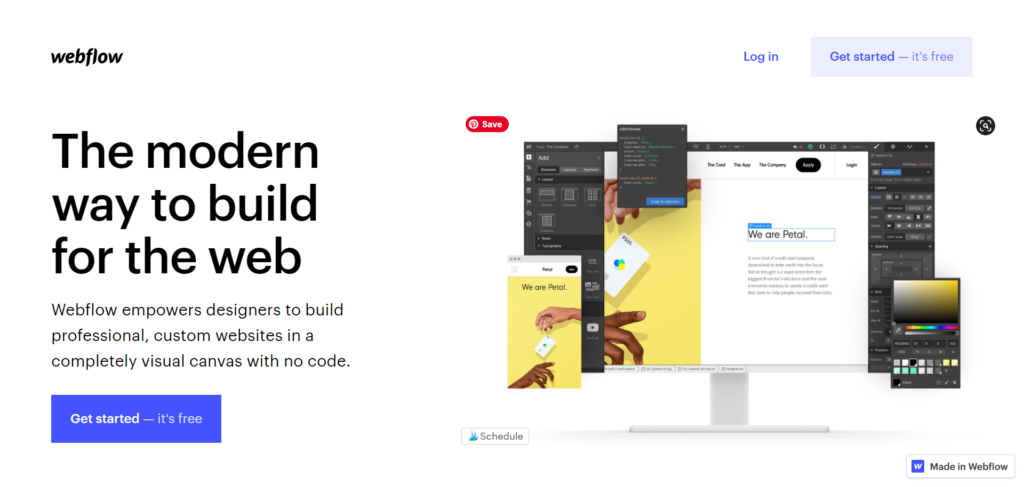
Webflow is a self-hosted platform offering a visual website builder that goes beyond the traditional template framework used by other platforms. Instead, it provides a flexible solution that allows you to create a fully customized website. In addition to the sheer breadth of design options available, the critical difference with Webflow is that your code is generated when you use the visual designer to move blocks around, add features, and customize your pages. As a result, everything you make is fully responsive across all devices.
In addition, you have complete layout control as you work, and when using Webflow’s designer, you have complete control over your JavaScript, HTML, and CSS. The Webflow Editor function allows you to create and edit your content on the page, which is much easier than working from a complicated backend CMS. As soon as your edits are done, you can publish your site with just a click of a button.
Pricing
Webflow is free to use while you’re building your website – you only pay when you’re ready to launch. At this point, there are two types of plans to choose from:
- Site plans: These allow you to connect your custom domain and add a checkout
- Account plans: These unlock added features, most notably, white-labeling.
Four paid-for Site plans are available, starting at $12 a month for the Basic Plan (based on annual billing), rising to the Enterprise Plan, which requires you to contact Webflow directly for a custom quote.
Then, there are two paid-for Account plans that start at $16 a month for the Lite Plan (again, based on annual billing) or $35 a month for the Pro Plan. The Lite plan is aimed at individuals, whereas the Team plans in Account plans are aimed at collaborative working from a shared dashboard.
Pros:
- It’s free to use as you build your site, so you can take all the time in the world to familiarize yourself with Webflow’s interface.
- Webfow’s pricing is reasonable.
- You have incredible design freedom, without having to code anything
Cons:
- If you’re an absolute beginner, this platform comes with a steeper learning curve
- Different pricing plans come with varying traffic limits – so watch out for that as you scale your store.
- Apparently, Webflow isn’t 100% compatible with Firefox and Edge.
👉 Read our full Webflow review.
10. Ecwid
Here’s a platform targeting small businesses. Once you’ve set up your free Ecwid website (also known as an Ecwid Instant Site), you can sync it with your socials, in-person store, and online marketplaces like Amazon.
Ecwid can be used in tandem with an existing website you already own to transform it into an online store. Alternatively, you can build an entirely new website from scratch. Ecwid promises that you can do the latter “in just 5 minutes with simple, customizable design tools.”
There are 70+ customizable design templates available for your eCommerce website. In addition, Ecwid doesn’t charge setup charges, transaction fees, and you get a free online shopping cart.
When you sign up for an Ecwid account, you have access to an ‘Ecwid Instant Site’ with built-in eCommerce functionality. Instant Site has an intuitive editor where you can choose different design options to ensure your site reflects your brand. It allows you to select your site’s font, layout, colors, photography, and more. In addition, the Ecwid Instant Site comprises a series of customizable blocks that you can add and edit to build your website the way you want. Once you’ve done this, then you can drag and drop blocks onto the page where you need them.
Pricing
You can create your store for free, but you need to opt for one of three pricing plans once you start selling. The cheapest is the Venture Plan starting at £12.50 a month (if you pay annually), and the most expensive is the Unlimited Plan costing £382.50 a month (again, based on annual billing). These prices don’t include 20% VAT.
Pros:
- Ecwid websites are free and quick to set up
- The starting prices are affordable
- It’s easy to transform your existing business websites into fully functioning online stores
Cons:
- Limited features on the free plan include not being able to sell on social media sites.
- You can only sell up to ten products on the free plan
- There’s no live chat or phone support on the free program. Instead, you’ll have to source help from Ecwid forums and self-help pages.
👉 Read our Ecwid review.
11. WooCommerce
WooCommerce is built on WordPress’s CMS, which runs a big chunk of the internet. WooCommerce, like WordPress, is an open-source solution, and, at the time of writing, the platform powers around 28% of all online stores.
WooCommerce is a WordPress plugin. I.e., it’s not a stand-alone website builder. Instead, you’ll need to:
- Find your own web hosting provider
- Install WordPress
- Build your website using WooCommerce to handle the eCommerce part of your WordPress site.
The platform is fully customizable, and you can extend WooCommerce's core functionality by downloading and using apps from WordPress’s extensive marketplace. There’s also a wide choice of free and paid-for themes, which often come with detailed support on installing, using, and customizing them.
Pricing
WooCommerce is free to download and use. However, you may find yourself paying for themes and plugins, and of course, your own web domain and hosting.
Pros:
- You can sell physical and digital goods.
- The WooCommerce plugin is free to use
- WooCommerce integrates with 140+ region-specific payment gateways
- There aren’t any sales limits
Cons:
- Setting up your WooCommerce site comes with a slightly steeper learning curve if you’re a complete beginner
- It only works with WordPress sites, so if you’re not a WP fan, this isn’t the plugin for you.
- Website maintenance is tricky – if you’ve downloaded plugins, don’t just immediately install WooCommerce’s updates, because the developers of the apps and themes you’re using may not have updated their products to remain compatible. Instead, you should test your store in a closed environment first.
👉 Read our full WooCommerce review.
Choosing the Best Ecommerce Website Builder in the UK
Deciding on the best website builder isn’t an easy task. But, ultimately, your decision will likely be influenced by a mixture of pricing, customer support, template quality, ease of setup, scalability – to name but a few!
Each of our ten options comes with its own set of positives and negatives. So, the important thing is to do some background research and take advantage of any free trials to ensure you’re happy with the website builder before parting with your hard-earned cash.
That said, Shopify is excellent if you’re looking for first-rate support, attractive templates, and scalability. However, if you’re after a website builder with user-friendliness at its core, Wix is your best bet. Alternatively, platforms that promise quick setup and ease of use are Ecwid and GoDaddy.
Have you decided on the best ecommerce website builder in the UK for your business? Let us know how you feel about creating your own website in the comments below.


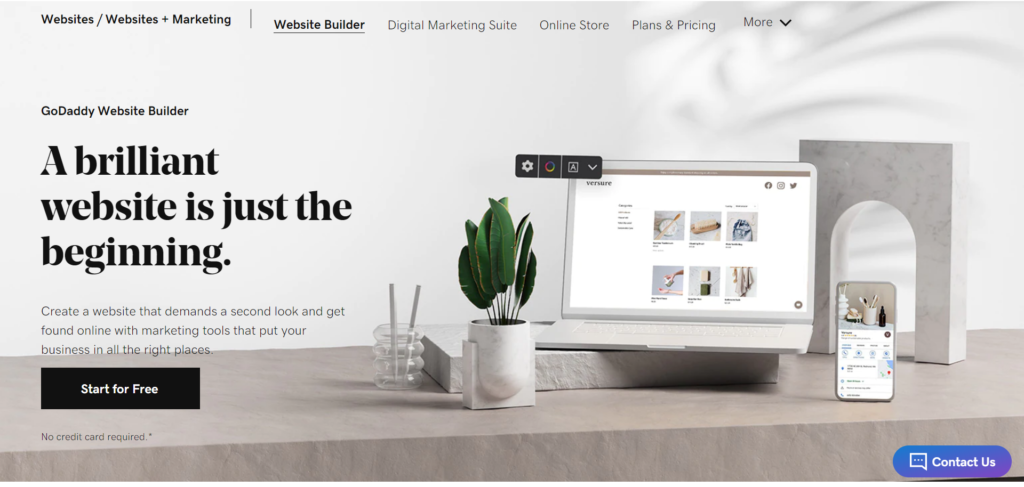
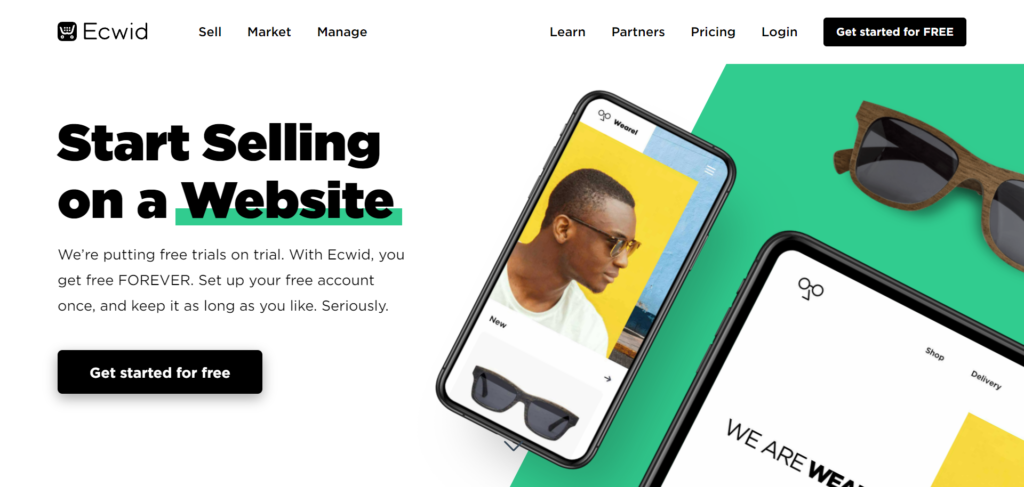
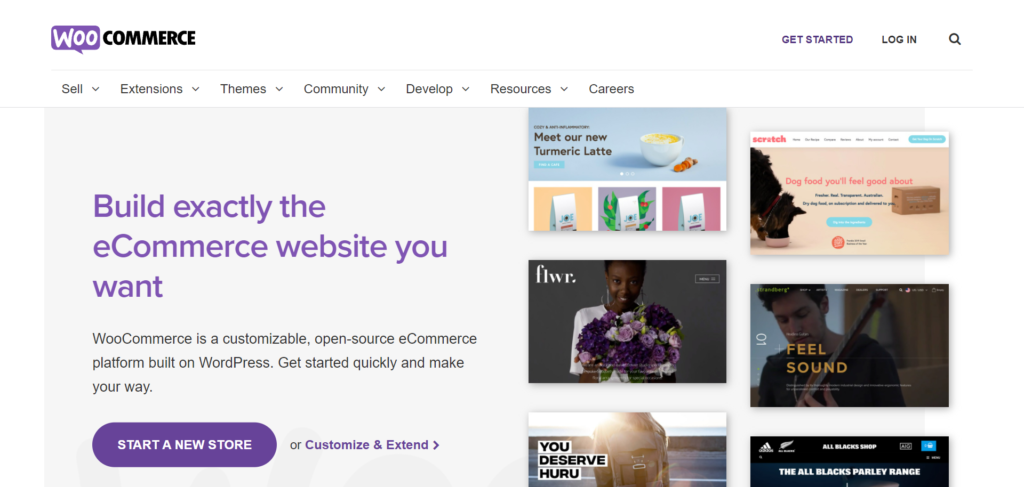


Comments 0 Responses